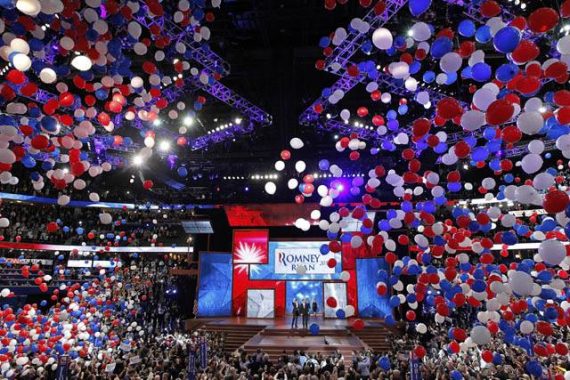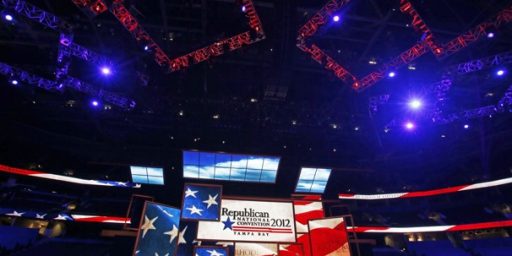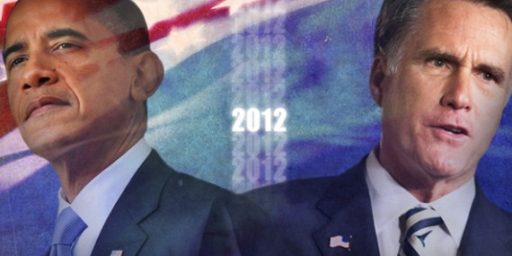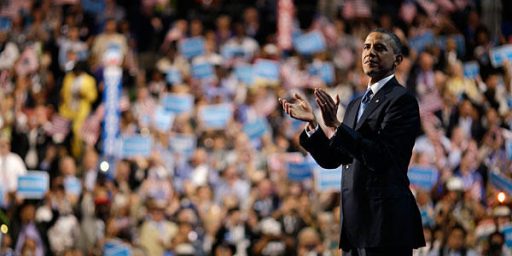Political Conventions Prove Their Own Uselessness
The recent;y concluded party conventions are further evidence that the events have largely outlived their usefulness.
Before the political conventions began two weeks ago, I noted that the events were largely an anachronism that could be, if not eliminated entirely, at least scaled back significantly in terms of the amount of television time they took up. With both conventions behind us and four years for everyone to contemplate what happens the next time the two political parties have to get together and nominate a Presidential candidate, it’s becoming quite apparent that the old-style political convention just doesn’t matter very much in the modern world:
CHARLOTTE, N.C. — The goal of the Democratic convention was to draw a sharp contrast between the visions offered by President Obama and Mitt Romney, promote a first-term record that many Democrats feel Mr. Obama has failed to articulate and persuade nervous Americans to stick with this president through tough times.
For Republicans, the goal of their convention was to flesh out a candidate who had been caricatured as bloodless, portray Mr. Obama as out of his depth and make voters who supported Mr. Obama in 2008 comfortable with leaving him in November for a lesser-known opponent.
As Democrats left here on Friday, the emerging consensus was that Mr. Obama had gone further in meeting the goals.
But even as the grading begins, the overriding question might be how much these conventions mattered. There is growing evidence that this year more than ever, the political significance of these extravagant and costly events was on the decline, just another in an ever-growing vortex of forces that help shape the election.
“There was a day where these conventions were covered much more intensively, there was less to watch on TV and voters were more open,” said David Axelrod, a senior adviser to Mr. Obama. “But now, by the time the conventions took place, 90 percent of voters are locked in.”
Mr. Axelrod said the conventions had become “much more marginal than they once were” and were now much less about reaching undecided voters, since so few watch, and more of a pep rally to motivate the base. That is no small thing, he said, but certainly far short of the significance that conventions once held.
Stuart Stevens, Mr. Axelrod’s counterpart in the Romney campaign, said conventions offered the party a platform to make its case but long ago lost their potential to “slingshot you forward.”
“One thing about this race that I kept muttering about even before the conventions is that more ads have been run this year before the convention even started than were run in all of ’08,” Mr. Stevens said.
When measured by viewership and the number of prime-time hours that the networks devote to them, the conventions have been on the wane since the days when there were actually contested battles on the floor for the nomination. But changes in campaigns over the past four years have hastened their slide.
Voters in swing states have already been inundated with months of commercials from the Obama campaign, which decided to start advertising early, and from independent committees supporting Mr. Romney, not to mention 24-hour cable news coverage, delivered with a partisan tone by some networks.
After all that, there is little in the conventions, which themselves resemble elongated advertisements, to draw viewers’ interest or provide them with information that could sway their opinions.
Since 2004, conventions have taken place later in the season, and the practice of separating them by a few weeks has long fallen by the wayside. That created a 10-day blur of convention coverage, challenging campaign officials who are looking for some way to break through. And by Labor Day, the holiday that separated the two conventions this year, voters are much further along the decision-making track and, particularly in swing states, are awash in information about the candidates.
“I think they have absolutely no impact on election results whatsoever,” said Allan J. Lichtman, a history professor at American University in Washington. “And people are catching on these conventions don’t matter. They are just daylong infomercials. People are beginning to realize that.”
There seems to be evidence to back up Professor Lichtman’s beliefs. As I have noted several times during the past two weeks, viewership for both conventions was down from the levels of 2008, and though the viewership for the Democratic Convention was slightly higher than for the Republicans, even the final night of the event wasn’t able to reach the levels that President Obama reached in 2008. Part of the reason for this likely is the fact that there’s a substantial minority of Americans that have quite simply tuned this election out completely, but I it strikes me that Lichtman gets it right when he theorizes that the American people are catching on to the fact that these conventions are, for the most part, a massive waste of time. The days when a political convention actually accomplished anything important, or made real news, are long gone, the last time you can say that really happened was in 1976 when Reagan and Ford went into the GOP Convention with most Republicans not sure which one of them would end up getting a majority of the delegates. Four years later, there was some real drama as both conventions as Ted Kennedy overshadowed Jimmy Carter with a speech that was anything but a concession, and the GOP Convention was the site of intrigue for more than a day as Ronald Reagan conferred with his aides over the selection of a running mate. Since then, though, these conventions have been entirely scripted affairs, and in the modern era they have indeed become the week-long infomercials that Lichtman refers to.
Just take a look at the two conventions that just concluded. With the possible exception of the Clint Eastwood schtick and the kerfuffle over the Democratic Platform’s omission, there was absolutely nothing that happened over the course of the past two weeks that wasn’t part of a carefully scripted, planned event designed to portray each party and each candidate in the best possible light. Why such an event is entitled to both obsessive coverage from the cable and broadcast news networks and tens of millions of dollars in funding from the Federal Election Commission is beyond me. If the Republican and Democratic parties want to put on a week-long infomercial then let them pay for it themselves, and let them pay some cable network somewhere for the air time necessary to broadcast it. We’re long past the time where these are newsworthy, or even interesting, events.
Beyond the television ratings, the impact of these events on the polls also suggests that political conventions have outlived their usefulness. Whatever bounce Mitt Romney may have received from the Republican National Convention has already disappeared. The President, meanwhile, currently appears to be getting a bounce from his own convention but there’s every reason to believe that it will be as temporary as the other upticks in the polls we’ve seen from the beginning of the summer. If these conventions actually still mattered, wouldn’t we see some evidence of them having an impact on the race? What happened to the days where conventions would significantly move polls, like they did in 1988 and 1992? At this point, it looks like the polls are going to be in roughly the same place they were before the conventions even started. That too is a reason to suggest that these conventions have outlived their usefulness and their relevance.
Perhaps we’ll see some reform next time around. Perhaps the parties will decide to take the advice that some have given that the conventions public business can be cut back to a single day that includes the nomination, speeches by the two people on the ticket, and perhaps a keynote address. Honestly, do we really need anything more than that?







As the U.S. becomes a one party state, wouldn’t a better question be have the general elections becoming useless. How many senate and Congressional seats really competitive. How many state wide elections are competitive. How many people will go to the polls in November where every election they vote in will be decided by double digit wins.
As the U.S. becomes a one-party-state, major changes need to take place in how politics works. The primary system needs to be totally reorganized, how seniority in Congress works needs to be changed, how the media reports on politics needs to be changed.
Look, Doug, we get it. You hate the conventions. Just don’t watch them then. This hobby horse your on is starting to look a little worn out.
I liked watching the major Democratic speeches and flipping through concurrent twitter on my phone. YMMV.
(James was talking about buying a new car, or something crazy.)
Politics is “Hollywood for the Ugly,” (author unknown)
Pete,
Actually, the line is “Washington, D.C. is Hollywood for ugly people,” but your point is correct
I don’t think their useless. Voters really get to know the Republicans and the Democrats, and then they act accordingly. What should be done is to add Conventions before the midterm elections…. 🙂
Just because recent cycles haven’t had the drama of actually deciding the nominee at the convention doesn’t mean that will always be the case. It is quite possible that in the future there will be primary seasons in which no single candidate has enough delegates to secure the nomination and the nominee will be picked at the convention.
@Septimius:
The idea that there could be a brokered convention is long over. The better question is whether the nomination has been in question after the New Hampshire primary. Other than Hillary Clinton’s refusal to face facts and give up, the winner of the nomination has been apparent by the end of the first super Tuesday.
In the future, will there be any question on who will be the nominee after the New Hampshire primary?
Television killed the usefulness of the convention and thus, the conventions should be killed.
How can you write this and http://www.outsidethebeltway.com/obamas-convention-bounce-becoming-more-apparent the same day?
Either political conventions matter, or the other post is irrelevant.